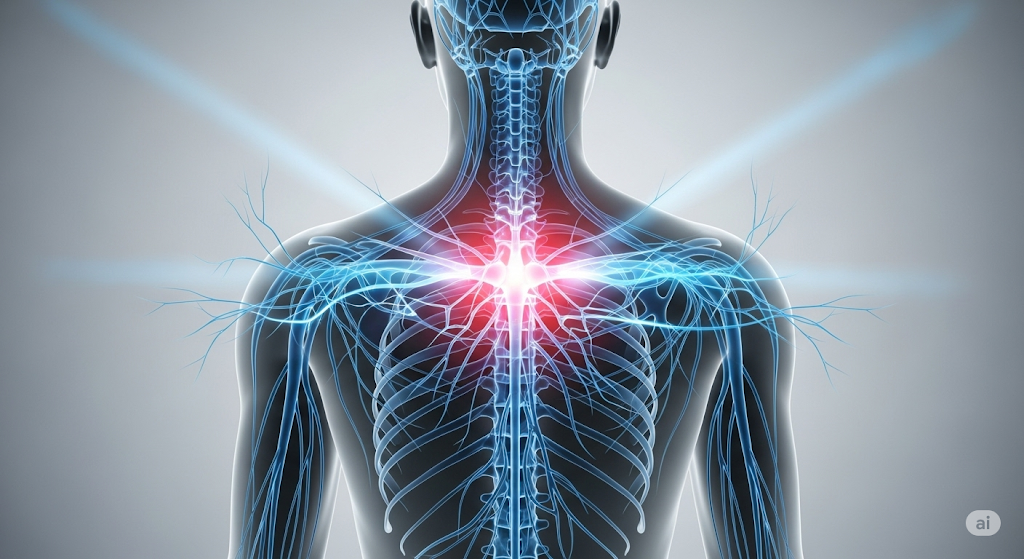Nerve Pain
Nerve pain can feel like an unwelcome shadow, lurking in the background and disrupting your daily life. Known scientifically as neuropathic pain, its unpredictable nature can leave you feeling frustrated and isolated. Understanding the underlying causes—from injury and infection to conditions like diabetes and fibromyalgia—is essential for finding effective relief. In this article, we’ll unravel the complexities of nerve pain, exploring its symptoms and how they impact your quality of life.
More importantly, we’ll delve into practical strategies for relief, empowering you to reclaim control over your well-being. Whether you’re seeking tips for managing discomfort or looking to understand what might be triggering your pain, this comprehensive guide aims to illuminate your path to recovery. Join us as we explore the multifaceted world of nerve pain and uncover actionable solutions that can make a real difference in your life.
What is Nerve Pain?
Nerve pain, also known as neuropathic pain, is a complex and often debilitating condition that arises from damage or dysfunction within the nervous system. Unlike nociceptive pain, which stems from physical injury to tissues, neuropathic pain is rooted in the nervous system itself. This type of pain is notorious for its severity and persistence, often presenting as a burning, tingling, or stabbing sensation. It can affect any part of the body and may either be continuous or intermittent, making it an unpredictable and challenging condition to manage.
The nervous system is a highly intricate network responsible for transmitting signals between the brain, spinal cord, and other parts of the body. When these nerves are damaged or malfunction, they can send incorrect signals to the brain, resulting in the sensation of pain. This miscommunication can occur due to a variety of reasons, including injury, illness, or even side effects from certain medications. Understanding the nature of nerve pain is crucial for both patients and healthcare providers, as it often requires a different approach compared to other types of pain.
Neuropathic pain can significantly impact a person’s quality of life, affecting their ability to perform everyday activities and diminishing their overall well-being. Those who suffer from nerve pain often describe it as a persistent and relentless condition that can lead to emotional distress and social isolation. By gaining a deeper understanding of what nerve pain is and how it manifests, individuals can take proactive steps towards managing their symptoms and improving their quality of life.
Common Causes of Nerve Pain
Nerve pain can be attributed to a myriad of underlying causes, each contributing to the disruption of normal nerve function. One of the most prevalent causes is physical injury or trauma to the nerves. This can result from accidents, falls, or surgical procedures that inadvertently damage nerve tissues. For instance, a slipped disc in the spine can compress nearby nerves, leading to sharp, shooting pain that radiates down the legs, a condition commonly known as sciatica.
Infections are another significant cause of neuropathic pain. Certain viral infections, such as shingles (caused by the varicella-zoster virus), can lead to a painful condition called postherpetic neuralgia. This occurs when the virus reactivates and inflames the nerves, causing intense pain that can persist for months or even years after the initial rash has healed. Bacterial infections like Lyme disease and viral infections such as HIV can also damage nerves and result in chronic pain.
Chronic medical conditions are often at the root of neuropathic pain. Diabetes is a prime example, where prolonged high blood sugar levels can lead to diabetic neuropathy, a condition characterized by nerve damage that primarily affects the feet and legs. Autoimmune diseases such as multiple sclerosis (MS) and lupus can also cause nerve inflammation and damage, leading to persistent pain. Additionally, conditions like fibromyalgia, which is marked by widespread musculoskeletal pain, often have a neuropathic component, making the pain more complex and challenging to treat.
Symptoms of Nerve Pain
The symptoms of nerve pain can vary widely from person to person, depending on the underlying cause and the specific nerves affected. However, there are some common characteristics that tend to define neuropathic pain. One of the hallmark symptoms is a burning or tingling sensation, often described as feeling like pins and needles. This sensation can be persistent or intermittent and may be accompanied by numbness or a loss of sensation in the affected area.
Another typical symptom is shooting or stabbing pain that can occur spontaneously or be triggered by certain movements or stimuli. This type of pain is often described as electric or searing and can radiate along the path of the affected nerve. For example, in conditions like sciatica, the pain may start in the lower back and travel down the leg. Similarly, in trigeminal neuralgia, a condition affecting the facial nerves, patients may experience intense, sudden facial pain.
In addition to these sensory symptoms, individuals with neuropathic pain may also experience muscle weakness, impaired coordination, and increased sensitivity to touch (allodynia). Allodynia occurs when a normally non-painful stimulus, such as light touch or temperature changes, causes pain. These symptoms can significantly hinder daily activities and reduce the overall quality of life. Recognizing these symptoms early and understanding their impact is essential for seeking appropriate treatment and managing the condition effectively.
Effective Relief Strategies for Nerve Pain
Managing nerve pain through natural methods has become increasingly popular among individuals seeking lasting relief without relying on harsh pharmaceuticals. Unlike conventional medications that often offer temporary results and come with unwanted side effects, natural therapies aim to address the root causes of nerve dysfunction—such as inflammation, oxidative stress, and nutrient deficiencies—while promoting overall well-being. These approaches are especially appealing for those with chronic neuropathic conditions who are looking for sustainable, long-term support.
Key natural interventions include the use of clinically studied nutrients and herbs known for their nerve-calming and regenerative properties. Supplements containing Magnesium Glycinate, Alpha Lipoic Acid, Coenzyme Q10, L-Carnitine, and Turmeric Extract have been shown to reduce nerve inflammation, improve blood flow, and support healthy nerve signaling. When combined with lifestyle strategies—like an anti-inflammatory diet, stress reduction techniques, and gentle exercise—these nutrients can significantly enhance nerve function and reduce symptoms like tingling, burning, and numbness.
One comprehensive option that brings many of these science-backed ingredients together is Arialief—a natural nerve support supplement designed to help calm overactive nerves and promote long-term nerve repair. With a formula that includes magnesium, antioxidants, and anti-inflammatory compounds, Arialief offers a holistic approach for those seeking an alternative to conventional medications. Many users report feeling noticeable improvements in comfort, energy, and sleep within weeks of use, making it a valuable addition to any natural nerve pain management plan.
What sets Arialief apart is its commitment to natural healing without compromise. Unlike many supplements that rely on stimulants or synthetic additives, Arialief uses only clean, bioavailable ingredients that work in harmony with the body. It’s manufactured in FDA-registered facilities under strict quality standards, ensuring purity and potency. Whether you’re managing diabetic neuropathy, age-related nerve pain, or discomfort from chronic inflammation, Arialief offers a gentle yet powerful solution to support your nerve health—naturally.
To learn more about Arialief, watch the full video here.
Lifestyle Changes to Manage Nerve Pain
Making certain lifestyle changes can have a profound impact on managing nerve pain and improving overall well-being. One of the most crucial changes is adopting a healthy diet. A balanced diet rich in vitamins, minerals, and antioxidants can support nerve health and reduce inflammation. Foods high in omega-3 fatty acids, such as fatty fish, nuts, and seeds, can help protect nerves and reduce pain. Additionally, maintaining stable blood sugar levels through a diet low in refined sugars and high in fiber is essential for individuals with diabetic neuropathy.
Regular physical activity is another key component in managing nerve pain. Exercise helps improve blood flow, reduce inflammation, and release endorphins, which are the body’s natural painkillers. Low-impact exercises like walking, swimming, and cycling are particularly beneficial for individuals with neuropathic pain, as they minimize stress on the joints while promoting overall fitness. It is important to start slowly and gradually increase the intensity and duration of exercise to avoid exacerbating pain.
Stress management is also vital for individuals coping with nerve pain. Chronic stress can exacerbate pain and lead to a cycle of increased discomfort and emotional distress. Techniques such as deep breathing exercises, meditation, and mindfulness can help reduce stress levels and promote relaxation. Additionally, ensuring adequate sleep and practicing good sleep hygiene can improve pain management and overall health. By making these lifestyle changes, individuals can take proactive steps toward managing their nerve pain and enhancing their quality of life.
When to Seek Professional Help for Nerve Pain
While some nerve pain can be managed with over-the-counter treatments and lifestyle changes, it is important to recognize when professional help is needed. Persistent or severe pain that does not respond to self-care measures should be evaluated by a healthcare provider. Additionally, if the pain is accompanied by other concerning symptoms, such as muscle weakness, loss of coordination, or changes in bladder or bowel function, it is crucial to seek medical attention promptly. These symptoms may indicate a more serious underlying condition that requires immediate intervention.
A healthcare provider can conduct a thorough evaluation to determine the cause of the nerve pain and develop an appropriate treatment plan. This may involve a combination of diagnostic tests, medications, physical therapy, and other interventions. In some cases, referral to a specialist, such as a neurologist or pain management specialist, may be necessary for further evaluation and treatment.
Early intervention is key to preventing the progression of nerve pain and minimizing its impact on daily life. By seeking professional help at the onset of symptoms, individuals can receive timely and effective treatment, reducing the risk of complications and improving their overall prognosis. Recognizing the importance of professional care and knowing when to seek help is essential for managing nerve pain effectively and maintaining a high quality of life.



